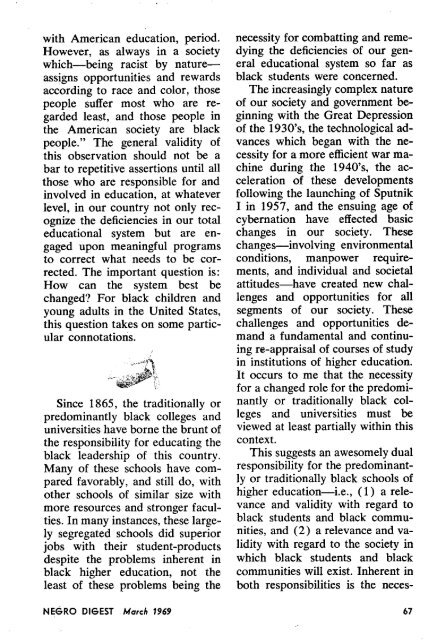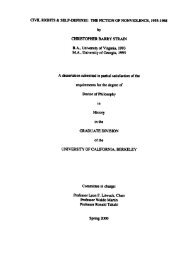Negro Digest - Freedom Archives
Negro Digest - Freedom Archives
Negro Digest - Freedom Archives
Create successful ePaper yourself
Turn your PDF publications into a flip-book with our unique Google optimized e-Paper software.
with American education, period.<br />
However, as always in a society<br />
which-being racist by natureassigns<br />
opportunities and rewards<br />
according to race and color, those<br />
people suffer most who are regarded<br />
least, and those people in<br />
the American society are black<br />
people ." The general validity of<br />
this observation should not be a<br />
bar to repetitive assertions until all<br />
those who are responsible for and<br />
involved in education, at whatever<br />
level, in our country not only recognize<br />
the deficiencies in our total<br />
educational system but are engaged<br />
upon meaningful programs<br />
to correct what needs to be corrected<br />
. The important question is :<br />
How can the system best be<br />
changed? For black children and<br />
young adults in the United States,<br />
this question takes on some particular<br />
connotations .<br />
Since 1865, the traditionally or<br />
predominantly black colleges and<br />
universities have borne the brunt of<br />
the responsibility for educating the<br />
black leadership of this country .<br />
Many of these schools have compared<br />
favorably, and still do, with<br />
other schools of similar size with<br />
more resources and stronger faculties<br />
. In many instances, these largely<br />
segregated schools did superior<br />
jobs with their student-products<br />
despite the problems inherent in<br />
black higher education, not the<br />
least of these problems being the<br />
NEGRO DIGEST MarcF 1969<br />
necessity for combatting and remedying<br />
the deficiencies of our general<br />
educational system so far as<br />
black students were concerned .<br />
The increasingly complex nature<br />
of our society and government beginning<br />
with the Great Depression<br />
of the 1930's, the technological advances<br />
which began with the necessity<br />
for a more efficient war machine<br />
during the 1940's, the acceleration<br />
of these developments<br />
following the launching of Sputnik<br />
I in 1957, and the ensuing age of<br />
cybernation have effected basic<br />
changes in our society . These<br />
changes-involving environmental<br />
conditions, manpower requirements,<br />
and individual and societal<br />
attitudes-have created new challenges<br />
and opportunities for all<br />
segments of our society . These<br />
challenges and opportunities demand<br />
a fundamental and continuing<br />
re-appraisal of courses of study<br />
in institutions of higher education .<br />
It occurs to me that the necessity<br />
for a changed role for the predominantly<br />
or traditionally black colleges<br />
and universities must be<br />
viewed at least partially within this<br />
context.<br />
This suggests an awesomely dual<br />
responsibility for the predominantly<br />
or traditionally black schools of<br />
higher education-i.e ., (1) a relevance<br />
and validity with regard to<br />
black students and black communities,<br />
and (2) a relevance and validity<br />
with regard to the society in<br />
which black students and black<br />
communities will exist . Inherent in<br />
both responsibilities is the neces-<br />
67
















